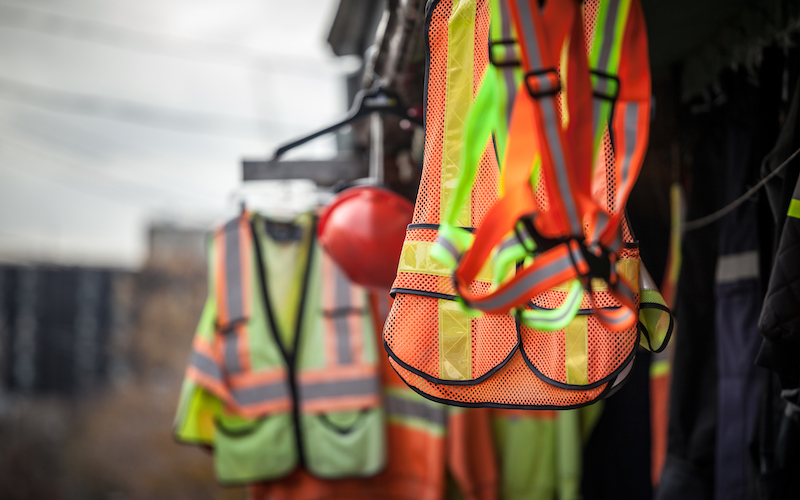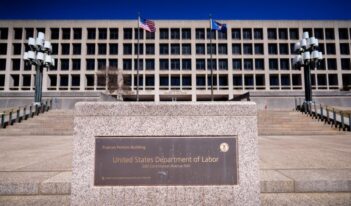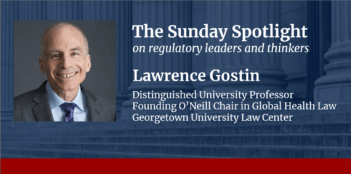
The hyper-deference courts provide to agencies has failed to protect workers from OSHA inaction amid COVID-19.
Virginia is the first state in the nation to issue mandatory safety rules requiring employers to take steps to protect workers from the coronavirus, filling a conspicuous and dangerous void left by the federal Occupational Safety and Health Administration (OSHA).
Virginia is one of 22 states that runs its own worker safety and health program, which, according to federal law, may be no less stringent than the rules developed by OSHA. The 22 states can, however, adopt stricter regulations, as Virginia has done. Virginia’s decision sets it apart from the 21 other states with their own programs, none of which have taken such steps, and also from OSHA itself.
Employees outside these 22 “state plan” states have to rely on OSHA for protection. Sadly but unsurprisingly, the federal agency has refused to adopt any enforceable regulations protecting workers from the coronavirus. It was able to move quickly in the early days of the pandemic to inform employers that they did not need to file required reports concerning workers who had contracted the virus unless an employer was sure that the exposure had occurred at work. This reporting requirement effectively exempts employers from any reporting, and OSHA seems to have no interest in doing anything meaningful to protect workers.
The epidemic of infections in meatpacking plants and other high-risk workplaces illustrates the need for OSHA to issue an emergency rule, as do the thousands of complaints that the agency has received about the failure of employers to protect them from the COVID-19 pandemic.
So far, OSHA has been content to issue voluntary guidance, which is unenforceable and ironic, given the Trump Administration’s years-long attack on agency guidance. This purely voluntary approach sends a message to employers that they need not take strong preventative actions, and it “strips workers of their legal right to seek and receive a worksite inspection by OSHA.” It also robs the communities, to which workers return, of protections against the deadly virus.
OSHA in the Obama Administration worked on a pathogen protection standard to protect health care workers in response to the H1N1 pandemic of 2009 to 2010, which would have been a useful starting point for the agency to craft a coronavirus standard. But the Trump Administration put the project on hold indefinitely and has never gotten back to it.
Workers cannot sue OSHA for inaction because there is no mandatory duty to issue a regulation. The only way to attack inaction is to petition an agency to develop a rule. A court, however, out of respect for the agency’s need for priority-setting, will apply extremely deferential review if an agency rejects a rulemaking petition. When the American Federation of Labor and Congress of Industrial Organizations recently petitioned the agency to issue an emergency COVID-19 standard and appealed OSHA’s rejection of the petition, the U.S. Court of Appeals for the D.C. Circuit in one paragraph rejected the appeal, stating the agency’s decision was entitled to “considerable deference.”
The agency, in part, justifies the lack of an enforceable rule with the fact that employers are subject to a general duty clause that requires them to “furnish to each of their employees employment and a place of employment which are free from recognized hazards that are causing or are likely to cause death or serious physical harm to his employees.” But the reality is that the agency has not filed a single action to enforce that clause despite the obvious failure of meatpacking plants and other employers to protect their workers.
As with the failure to adopt regulations, workers are powerless to hold agencies accountable for ineffective enforcement. The U.S. Supreme Court has adopted a presumption against judicial review of enforcement decisions that can only be overcome if there is a clear statutory duty to enforce a legislative mandate. Even though this bow to executive discretion is understandable in the U.S. constitutional system, it also makes a mockery of the regulatory protections to which Americans, and in this case workers, are entitled.
It is possible to have something more than abject deference and still honor the idea that agencies are in the best position to decide their rulemaking and enforcement priorities. The failure of OSHA to respond to the pandemic requires at least greater judicial supervision than a one-paragraph brush-off from the D.C. Circuit. The court accepted at face value that OSHA’s voluntary standard approach was a reasonable choice, even though the evidence—in excess of 100,000 deaths from the virus, more than 2.5 million infections, and any number of workplace-related virus hotspots—raises strong doubts about this claim. At a minimum, the court should have required a more elaborate explanation from OSHA in light of the alarming situation.
Still, it is unlikely that the Supreme Court will overturn these longstanding doctrines concerning rulemaking and enforcement inaction. The U.S. Congress, however, should consider how to protect its statutory mandates and its prerogative to protect workers and the public by mandating that agencies have to provide non-arbitrary reasons for rejecting rulemaking and enforcement petitions. The scope of review, in other words, should be the same as when an agency adopts a rule, prompting a judge to take a hard look at the agency’s explanation. What constitutes an adequate explanation, however, would be adjusted in light of the lack of a rulemaking record and the necessity of agency priority setting.
The current hyper-deference that the courts pay to executive discretion on inaction may protect executive priorities, but it does so at the cost of ignoring existing law. Under the current judicial approach, an election in effect becomes a trump card (pun partially intended) to cancel the democratically developed mandates under which agencies operate.




